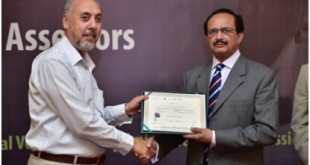ISLAMABAD, March 13, 2013: Pakistan is on its way to become one of the countries having adopted a National Vocational Qualification Framework (NVQF). This instrument will support the creation of better job prospects for learners in the technical and vocational stream of education and facilitate their career mobility.
This was announced at a two-day workshop on testing and evaluation techniques, which was organized by the Khyber Pakhtunkhwa Board of Technical Education in collaboration with the Technical and Vocational Education and Training (TVET) Reform Support Programme. The workshop was attended by principals and the faculty of TVET supported institutes from Khyber Pakhtunkhwa.
The main purpose of the workshop was to introduce the participants to testing and evaluation techniques. It further aimed to create awareness about the ongoing TVET sector reform, particularly in the areas related to the target group, such as for example the NVQF. Dr. Raimund Sobetzko, leader of component II of the TVET Reform Support Programme, briefed the participants of the workshop on the current status of NVQF.

The draft has been finalized through extensive consultations with public and private sector stakeholders in the TVET sector of Pakistan. The NVQF, which is shortly going to be implemented on a test basis, focuses on enhancing the quality of the existing learning and training structures towards a more demand-driven training delivery. It will also improve the recognition of prior learning and will expand possibilities for international recognition of qualifications. The Technical and Vocational Education and Training (TVET) Reform Support Programme, a five-year initiative co-funded by the European Union, the Embassy of the Kingdom of the Netherlands and the Federal Republic of Germany, has facilitated the formulation of the NVQF in Pakistan.
The NVQF is an instrument, which has already been introduced in several countries and classifies the level of skills, knowledge, understanding and responsibilities necessary for every job from the basic to the highest level. It is equally beneficial for trainees in the TVET system as well as for the industry and employers, said Dr. Sobetzko.
He further elaborated, that the NVQF will help standardize the training by accrediting the curricula against different levels of the framework. It will facilitate mobility within the TVET stream, as the learners will have the opportunity to enter into or progress within their chosen career track or even proceed to other vocational qualification opportunities at the same or higher level. Moreover, it will institutionalize a nationally-recognized, vocationally-specific qualification, making it more transparent and hence easing employers’ assessments of applicants.
The resource persons briefed the participants on how to elevate the standard of different training and education offers, in order to attract the employers towards a better skilled workforce in the market.
Raja Saad Khan, National Deputy Coordinator TVET Reform Support Programme briefed the participants on major elements of the TVET sector reform and on activities of the programme, which are being carried out at national level.
Prof Shakeel Ahmed, Director General Technical Education Khyber Pakhtunkhwa and Nasir Ali Khan, Chairman KP Board of Technical Education highlighted the importance of TVET and the steps, which his organization is undertaking to improve the examination system in the TVET sector. He thanked the TVET Reform Support Programme for supporting the overall reform activities in Pakistan in general and in Khyber Pakhtunkhwa in particular.
 Pakistan TVET REFORM Support Programme Technical and Vocational Education and Training (TVET) Reform support Programme
Pakistan TVET REFORM Support Programme Technical and Vocational Education and Training (TVET) Reform support Programme






